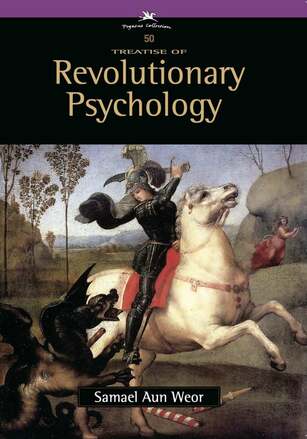Chapter 20: The Two WorldsTo observe, and to observe oneself are two completely
different things. Nonetheless, both demand attention. In observation, attention is directed toward the outside, towards the external world, via the windows of the senses. In self-observation, attention is directed inwards, and for this the senses of external perception are of no use, which is more than sufficient reason why it is difficult for the neophyte to observe his intimate psychological processes. |
The point of departure of conventional science in its practical aspect is the observable. The point of departure for the work on oneself is the self-observation, the self observable.
Unquestionably, these two abovementioned points of departure, take us in completely different directions.
Someone can grow old engrossed in the intransigent dogmas of conventional science: studying external phenomena; observing cells, atoms, molecules, suns, stars, comets, and so on, without experiencing any radical change within himself.
The type of knowledge that transforms someone internally can never be obtained through external observation.
The true knowledge that really can give rise to a fundamental internal change in us has as its base, the direct observation of oneself.
It is urgent to say to our Gnostic students that they observe themselves, in what manner they must observe themselves, and the reasons for this.
Observation is a means to modify the mechanical conditions of the world. Inner self observation is the means for internal change.
As a consequence or corollary of all this, we can, and must emphatically state that there exist two types of knowledge, external and internal, and that unless we have within us the magnetic center that can differentiate between the qualities of knowledge, this mixture of the two planes or orders of ideas may lead us into confusion.
Sublime pseudo-esoteric doctrines with a marked scientific spirit as their basis, belong to the sphere of the observable. Nonetheless, these doctrines are accepted by many aspirants as internal knowledge.
We find ourselves then, before two worlds, the external and the internal. The first of these is perceived by the senses of external perception. The second can only be perceived through the sense of internal self-observation.
Thoughts, ideas, emotions, aspirations, hopes, disappointments, etc., are internal, invisible to the ordinary and commonly used senses. And yet they are more real to us than the dining room table or the lounge chairs.
Certainly, we live more in our internal world than in the external, this is irrefutable, undeniable.
In our internal worlds, in our secret world, we love, desire, suspect, bless, curse, yearn, suffer, enjoy, are disappointed, and rewarded, etc., etc., etc.
Unquestionably, these two worlds, internal and external, can be verified by experience. The external world is the observable. The internal world is the self-observable in oneself, and is within us here and now.
Whoever truly wants to know the internal worlds of the planet Earth, or the Solar System, or Galaxy in which we live, must previously know their intimate world, their particular internal life, their own internal worlds. “Man, know thyself and you will know the Universe and the Gods.”
The more one explores this internal world called oneself, the more one will comprehend that we live simultaneously in two worlds, in two realities, in two spheres, the external and the internal.
Just as it is indispensable to know how to walk in the external world, to not fall into precipices, to not lose one’s way in the streets of the city, to select one’s friends, to not associate with the depraved, to not swallow poison, etc., so also, through the psychological work on oneself, we learn to walk in our internal world, which is explorable through self-observation.
Really, the sense of self-observation is atrophied in the decadent human race of this tenebrous era in which we live.
As we persevere with self-observation, the sense of intimate self-observation will develop progressively.
Unquestionably, these two abovementioned points of departure, take us in completely different directions.
Someone can grow old engrossed in the intransigent dogmas of conventional science: studying external phenomena; observing cells, atoms, molecules, suns, stars, comets, and so on, without experiencing any radical change within himself.
The type of knowledge that transforms someone internally can never be obtained through external observation.
The true knowledge that really can give rise to a fundamental internal change in us has as its base, the direct observation of oneself.
It is urgent to say to our Gnostic students that they observe themselves, in what manner they must observe themselves, and the reasons for this.
Observation is a means to modify the mechanical conditions of the world. Inner self observation is the means for internal change.
As a consequence or corollary of all this, we can, and must emphatically state that there exist two types of knowledge, external and internal, and that unless we have within us the magnetic center that can differentiate between the qualities of knowledge, this mixture of the two planes or orders of ideas may lead us into confusion.
Sublime pseudo-esoteric doctrines with a marked scientific spirit as their basis, belong to the sphere of the observable. Nonetheless, these doctrines are accepted by many aspirants as internal knowledge.
We find ourselves then, before two worlds, the external and the internal. The first of these is perceived by the senses of external perception. The second can only be perceived through the sense of internal self-observation.
Thoughts, ideas, emotions, aspirations, hopes, disappointments, etc., are internal, invisible to the ordinary and commonly used senses. And yet they are more real to us than the dining room table or the lounge chairs.
Certainly, we live more in our internal world than in the external, this is irrefutable, undeniable.
In our internal worlds, in our secret world, we love, desire, suspect, bless, curse, yearn, suffer, enjoy, are disappointed, and rewarded, etc., etc., etc.
Unquestionably, these two worlds, internal and external, can be verified by experience. The external world is the observable. The internal world is the self-observable in oneself, and is within us here and now.
Whoever truly wants to know the internal worlds of the planet Earth, or the Solar System, or Galaxy in which we live, must previously know their intimate world, their particular internal life, their own internal worlds. “Man, know thyself and you will know the Universe and the Gods.”
The more one explores this internal world called oneself, the more one will comprehend that we live simultaneously in two worlds, in two realities, in two spheres, the external and the internal.
Just as it is indispensable to know how to walk in the external world, to not fall into precipices, to not lose one’s way in the streets of the city, to select one’s friends, to not associate with the depraved, to not swallow poison, etc., so also, through the psychological work on oneself, we learn to walk in our internal world, which is explorable through self-observation.
Really, the sense of self-observation is atrophied in the decadent human race of this tenebrous era in which we live.
As we persevere with self-observation, the sense of intimate self-observation will develop progressively.


